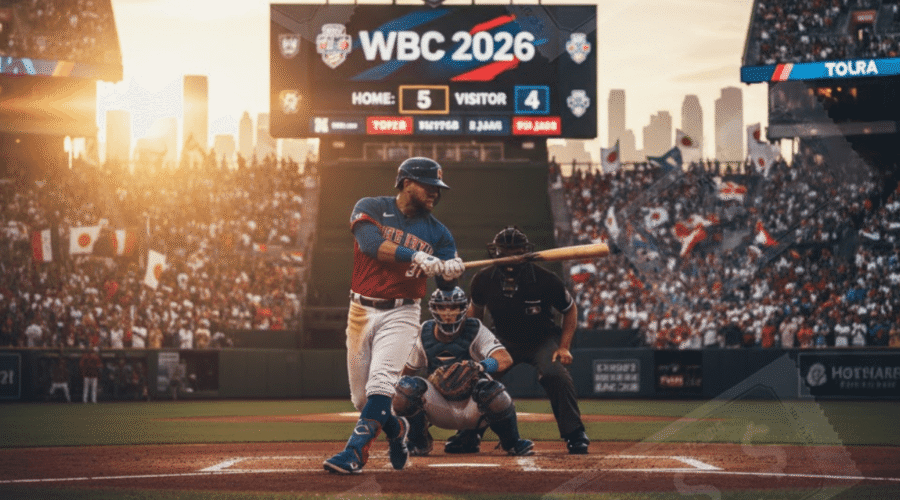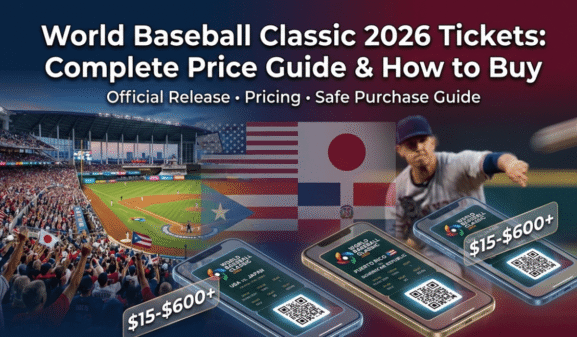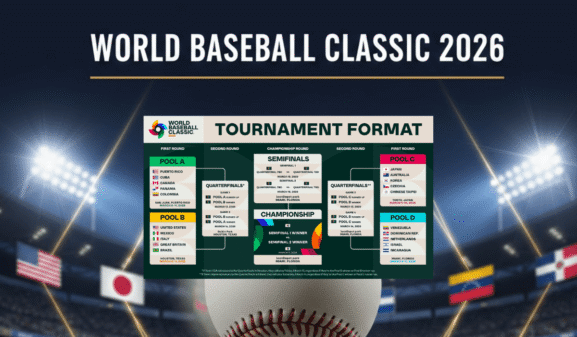World Baseball Classic 2026 Tickets, Prices & How to Buy
Picture this: it’s a crisp March evening in Miami, the bases are loaded, and your national team is one swing away from glory. The roar of 30,000 fans surrounds you, and you’re living every pitch of the World Baseball Classic final. Sounds incredible, right? But here’s the catch—getting those tickets requires strategy, timing, and knowing exactly where to look. With the 2026 tournament fast approaching and tickets already moving through various sales channels, the difference between scoring great seats and watching from your couch often comes down to preparation.
The World Baseball Classic 2026 promises to deliver that electric international baseball atmosphere from March 5–17, with pool play spreading across four iconic cities: Tokyo, San Juan, Houston, and Miami. Unlike regular-season games, where you can usually snag tickets on game day, WBC seats—especially for marquee matchups and the championship round—disappear fast. This guide cuts through the confusion around release dates, pricing tiers, and purchasing strategies so you can secure your spot without overpaying or missing out entirely.
Quick Takeaways
- Staggered official sales: San Juan single-game tickets released December 1, 2025; Tokyo, Houston, and Miami follow January 15, 2026
- Strip packages save money: Full-venue and country-specific strips went on sale mid-2025, offering better per-game value than last-minute single purchases
- Wide price spectrum: Budget-friendly upper-deck seats start around $15–$50, while championship and premium locations climb into hundreds or thousands
- Official channels first: Start with MLB/WBC ticket portals, venue box offices, and regional partners like Lawson (Japan) or boletos/prticket (Puerto Rico)
- Secondary market strategy: If official sales sell out, compare SeatGeek, StubHub, and TicketSmarter carefully—service fees and guarantees vary significantly
- Early action wins: Register on all platforms now, join team membership lists for presale access, and set price alerts before the January rush
Understanding the 2026 WBC Ticket Release Timeline
The World Baseball Classic doesn’t follow a simple “tickets on sale” model. Instead, organizers rolled out inventory in strategic waves designed to reward loyal fans, maximize attendance, and manage demand across four international venues. Here’s how the system works and why timing matters more than you might think.
The Presale Pyramid
Think of WBC ticket distribution as a pyramid. At the top, you’ll find full-venue strip packages—bundles that include every pool game at a specific stadium. These appeared first, typically in summer 2025, targeting serious fans and local season-ticket holders who wanted guaranteed access. Next came country-specific strips, which package all games featuring a particular national team (say, all Dominican Republic matches or all Japan games). These arrived in fall 2025 and offer a middle ground between commitment and flexibility.
The base of that pyramid? Single-game general public sales. These are what most casual fans wait for, and they come with the highest competition. San Juan’s Hiram Bithorn Stadium opened single-game sales on December 1, 2025, giving Puerto Rican fans and Caribbean baseball lovers first crack at individual matchups. The bigger venues—Tokyo Dome, Houston’s Minute Maid Park, and Miami’s loanDepot Park—synchronized their single-game releases for January 15, 2026.
Why the stagger? Smaller venues like San Juan’s 18,000-seat Hiram Bithorn need earlier buzz to ensure sold-out crowds, while the 40,000+ capacity stadiums in Houston and Miami can absorb later releases. Tokyo operates on its own timeline partly due to Japan’s unique ticketing culture and the intense local demand whenever Samurai Japan takes the field.
What This Means for Your Strategy
If you’re eyeing a specific matchup—imagine Team USA versus Puerto Rico in San Juan, or a Japan semifinal in Miami—early strip purchases or presale access dramatically improve your odds. Once those January 15 single-game sales open to the general public, inventory for premium matchups evaporates within hours. Lower-demand pool games might linger, but championship weekend seats? They’re essentially a presale-or-bust proposition unless you’re willing to pay secondary market premiums.
The lesson: treat ticket buying like playoff brackets. Have a primary plan (official presales), a backup (single-game public sales), and a contingency (reputable resale platforms). Flexibility on game selection and seating location multiplies your chances of actually getting inside the stadium.
Official Channels: Where to Buy Without Getting Burned
Navigating ticket platforms can feel like wandering through a digital maze, especially when unofficial resellers flood search results with inflated prices and dubious guarantees. Let’s establish the hierarchy of trust and explain exactly where your first clicks should land.
Primary Official Sources
Start at the source: the MLB/World Baseball Classic official ticket portal. This is your canonical hub—the digital box office that coordinates all four host cities, manages hospitality packages, and lists authorized regional partners. Bookmark this site and create an account early. Having your payment information, delivery preferences, and notification settings configured before sales open gives you precious seconds during high-demand releases.
Next, drill down to venue-specific channels. The Miami Marlins run sales for loanDepot Park through their membership portal and team website. The Houston Astros do the same for Minute Maid Park. These team sites frequently offer presales exclusively to season-ticket holders or paid members—think of it as VIP lane access before the masses arrive. In Tokyo, the Tokyo Dome operates through Japan’s Lawson ticket system and various club channels, which require navigating Japanese-language interfaces but reward persistence with better inventory access. San Juan relies on local platforms like boletos.com and prticket.com, which integrate with Puerto Rico’s event ecosystem.
Authorized Travel and Hospitality Partners
Here’s where things get interesting for fans building complete experiences rather than just securing seats. Companies like JTB (a major Japanese travel agency) bundle hotel stays, ground transportation, and guaranteed WBC tickets into all-inclusive packages. These cost more upfront but eliminate the stress of coordinating moving parts across international trips. You’re essentially paying a premium for certainty and convenience—worth it if you’re flying across oceans and can’t risk arriving in Tokyo or Miami without entry.
Similarly, MLB’s official hospitality partners offer premium packages that include club access, exclusive lounges, meet-and-greet opportunities, and prime seating. These aren’t for budget-conscious fans, but if you’re celebrating a milestone or treating clients, they deliver experiences beyond what general admission can provide.
When Official Channels Sell Out: Navigating the Secondary Market
Reality check: even with perfect timing, you might miss official sales. Popular matchups sell out in minutes. That’s where secondary marketplaces enter the picture—platforms like SeatGeek, StubHub, TicketSmarter, and Vivid Seats. These sites aggregate listings from individual sellers (season-ticket holders who can’t attend, speculators hoping to profit, or fans whose plans changed) and provide buyer protections that direct peer-to-peer sales don’t.
The catch? Service fees can add 20–40% to listing prices, and market dynamics shift daily. A seat listed at $300 one week might drop to $180 as game day approaches and sellers get nervous, or it might spike to $500 if teams advance and demand surges. The smart play: set price alerts, compare total checkout costs across platforms (not just face value), and prioritize sellers with high ratings and verified tickets. Never wire money outside the platform’s payment system—that’s where scams thrive.
One more pro tip: secondary platforms often have mobile apps with faster checkout flows than desktop sites. Download them early, enable notifications, and keep payment methods pre-loaded. When a deal appears, seconds matter.
What You’ll Actually Pay: Realistic Price Ranges by City and Stage
Let’s talk dollars and cents—because “tickets available” means nothing without knowing whether you’re budgeting $50 or $500 per seat. WBC pricing varies wildly based on venue size, local market economics, matchup significance, and seat location. Here’s the breakdown city by city.
San Juan (Hiram Bithorn Stadium)
Puerto Rico’s compact 18,000-seat venue creates intimacy but also supply constraints. Upper-deck general admission seats for pool play games have historically landed in the $20–$50 range on primary sales. However, when Puerto Rico plays—especially against rivals like the Dominican Republic—demand explodes and even nosebleed sections can command premiums on resale markets.
Official full-package listings (all pool games at Hiram Bithorn) showed premium Palco A sections around $1,440, illustrating how bundled VIP experiences scale upward. For single games, expect field-level and club seats to start around $100–$200 on primary sales, climbing higher if you’re shopping last-minute or through resellers.
Houston (Minute Maid Park)
Houston’s larger capacity and quarterfinal hosting duties create a tiered pricing landscape. Pool play games typically offer accessible options: $25–$80 gets you into the building for many matchups, with upper decks and outfield sections at the lower end. Quarterfinal games—where elimination stakes raise intensity—push prices upward, especially for infield seats. Think $100–$400 for decent sightlines once you factor in the later-round premium.
Season-ticket holders who bought full strips often enjoy lower per-game costs, another argument for committing early if you plan multiple visits.
Tokyo (Tokyo Dome)
Japan’s baseball culture adds unique complexity. Regular seating might start surprisingly affordable in local yen terms—equivalent to $15–$30 for distant upper sections—but marquee Japan matchups flip the script entirely. When Samurai Japan plays, even mid-tier reserved seats can demand hundreds of dollars on secondary markets, driven by national fervor and Tokyo’s massive population base.
Ticket distribution heavily favors Lawson presales and club member allocations, meaning casual international fans often find slim pickings by the time general sales open. If Japan is your target, prioritize presale access or consider travel packages that bundle tickets.
Miami (loanDepot Park)
As host of the semifinals and final, Miami occupies premium territory in both logistics and pricing. Pool play games offer the widest range: $30–$100 covers many seats on primary sales, with Marlins members accessing the best deals. But championship weekend? That’s a different beast entirely.
Secondary markets commonly list semifinal seats from $200–$600, while finals can soar to $300–$1,500+ depending on proximity to the action and which teams advance. VIP hospitality packages for the championship game routinely exceed $2,000 per person, bundling premium seats with all-inclusive food, beverages, and exclusive spaces.
The Reality of Resale Volatility
Here’s the uncomfortable truth: resale prices reflect supply, demand, and speculation in real time. A seat listed at $800 before teams clinch might drop to $400 if a favorite gets eliminated, or rocket to $1,200 if an underdog story captures imaginations. Championship seats on secondary platforms routinely command $300–$1,000+, with VIP packages climbing into multiple thousands.
Budget-conscious fans should target early official sales, consider country strips that average lower per-game costs, or embrace upper-deck seating. There’s no shame in the nosebleeds—atmosphere matters more than proximity when you’re watching elite international competition.
Your Smart Buying Playbook: Presales, Strips, and Last-Mile Tactics
Knowing when and where tickets appear means nothing without execution. Here’s your actionable playbook to maximize success whether you’re chasing pool play bargains or championship dream seats.
Register Everywhere, Register Early
Create accounts on every relevant platform: MLB/WBC official portal, Miami Marlins site, Houston Astros site, Tokyo Dome/Lawson, and boletos/prticket for Puerto Rico. Registration often unlocks queue priority during high-demand sales and enables saved payment methods that shave crucial seconds off checkout times. Enable email and SMS notifications so you don’t miss presale announcements.
Leverage Team Memberships for Presale Access
Here’s insider math: if a Marlins membership costs $50 but grants 24-hour early access to championship tickets, and secondary market premiums run $200+ over face value, that membership just paid for itself while securing better seats. The same logic applies to Astros season-ticket holder benefits or Tokyo club memberships. Evaluate whether membership fees are cheaper than resale premiums—often they are for high-demand games.
Strip Packages Deliver Better Per-Game Economics
Full-venue strips (all pool games at one stadium) and country strips (all games featuring one team) typically cost less per game than buying singles, while guaranteeing seat consistency and eliminating the stress of multiple checkout battles. If you’re planning stadium travel or want to follow a specific nation’s journey, strips are your financial and logistical friend.
The trade-off? Commitment. You’re locked into a schedule, which might not fit if flexibility matters. But for serious fans, strips represent the best value and lowest hassle.
Master the Checkout Sprint
When presales open, have multiple devices ready—laptop, tablet, phone—all logged in with saved payment info. Use wired internet connections where possible to avoid Wi-Fi hiccups. Presale inventory can vanish in under ten minutes for premium matchups, so treat checkout like a race. Don’t browse leisurely; add to cart and complete purchase immediately.
Secondary Market Strategy: Alerts, Comparison, and Patience
If official channels sell out, resist panic buying. Set price alerts on multiple secondary platforms for your target game and seat section. Prices often fluctuate as game day approaches—nervous sellers lower prices to ensure sales, while others hold firm on premium listings. Compare total costs including service fees, across SeatGeek, StubHub, and TicketSmarter before committing.
Prioritize platforms with buyer guarantees (replacement or refunds if tickets are invalid) and sellers with verified ratings. Avoid listings that feel too cheap—they’re often scams or restricted tickets (team staff allocations, media passes) that won’t grant entry.
Consider Hospitality for the Final
If budget allows and stress reduction matters, Miami championship hospitality packages offer premium seats, hotel coordination, exclusive lounge access, and often transportation—basically a turnkey experience. You’ll pay significant premiums over face value, but you’re buying certainty and luxury during what might be a once-in-a-lifetime event.
Read more: MLB All-Star Game 2026 Tickets Release Date, Pricing & How to Buy
City-by-City Travel and Logistics Essentials
Securing tickets is step one. Getting to the stadium, navigating local customs, and managing logistics complete the picture. Here’s what matters in each host city.
San Juan, Puerto Rico
Entry requirements: U.S. citizens need no passport (Puerto Rico is U.S. territory), but international travelers do. Stadium access: Hiram Bithorn is compact and urban—arrive early for parking or use ride-sharing to avoid congestion. Local fan culture is passionate and loud; embrace it. Ticket vendor: boletos.com and prticket.com handle local sales; interfaces are Spanish-first but manageable. Bonus tip: March weather is warm—hydrate and use sunscreen for day games.
Houston
Venue scale: Minute Maid Park holds 40,000+, meaning bigger crowds and more complex logistics. Parking: Check Astros season-ticket holder routes or pre-purchase parking passes to avoid game-day price gouging. Quarterfinals: Houston hosts elimination rounds, so expect hotels and restaurants to fill quickly. Book accommodations early. Transit: Houston sprawls; budget extra time for traffic if driving from the suburbs.
Tokyo
Cultural nuances: Japanese ticketing often involves e-tickets or physical pickup at Lawson convenience stores—familiarize yourself with the process before arrival. Tokyo Dome’s system differs from Western platforms. Language: Interfaces may default to Japanese; browser translation tools help, but patient navigation is essential. Timing: March in Tokyo can be cool and occasionally rainy—pack layers. Transit: Tokyo’s rail system is world-class; staying near major stations simplifies stadium access and city exploration.
Miami
Championship logistics: As the semifinal and final host, Miami sees the tournament’s biggest crowds. Flights surge, hotels fill, and prices spike across accommodations and dining. Early booking: If attending the final, secure travel and lodging months ahead or consider hospitality packages that bundle everything. Stadium location: loanDepot Park sits near downtown; ride-sharing and public transit (Metrorail) are viable, but expect game-day surge pricing. Weather: Late March in Miami is typically warm and humid—dress accordingly and stay hydrated.
Your Next Steps: From Reading to Seats
You’ve absorbed the details—now turn knowledge into action. Register on official ticket platforms today, even if sales have already opened. Join team membership programs if presale access aligns with your target games. Decide whether strip packages or single-game flexibility suits your plans and budget accordingly.
Set calendar reminders for resale market checks if you missed primary sales, and enable price alerts on secondary platforms. Compare total costs across vendors, never sacrifice buyer protections for small savings, and remember that nosebleed sections still deliver unforgettable atmosphere when elite national teams battle.
The 2026 World Baseball Classic offers a rare convergence: Olympic-caliber talent, national pride stakes, and international baseball culture compressed into two weeks. Whether you’re in Tokyo watching Japan defend home turf, San Juan feeling Puerto Rican passion shake the stands, Houston witnessing quarterfinal drama, or Miami celebrating under championship lights—being there beats watching from home every single time.
Frequently Asked Questions
Where is the World Baseball Classic 2026?
The tournament spans four cities for pool play: Tokyo (Tokyo Dome), San Juan, Puerto Rico (Hiram Bithorn Stadium), Houston (Minute Maid Park), and Miami (loanDepot Park). Quarterfinals split between Houston and Miami, while both semifinals and the final take place in Miami. This geography spreads international baseball across iconic venues while building toward a championship crescendo in South Florida.
How much for World Series tickets in 2025?
World Series 2025 ticket prices varied dramatically based on matchup, venue, and seat location, with secondary market averages commonly ranging from a few hundred dollars to several thousand for premium locations. For comparison context, WBC 2026 championship seats show similar resale dynamics—listings frequently appear in the $300–$1,500+ range depending on demand and proximity. For the best value on any major baseball event, prioritize official team box offices first, then use trusted secondary platforms only when primary sales are exhausted.
What are the key dates for the 2026 WBC?
Tournament action runs March 5–17, 2026. For ticket buyers, critical dates include: full-venue and country strip packages sold starting mid-2025; San Juan single-game public sales opened December 1, 2025; Tokyo, Houston, and Miami single-game public sales launched January 15, 2026. Always confirm specific timing through official MLB/WBC ticket pages before purchase, as exact hours and presale windows can shift with regional time zones and last-minute adjustments.
Are there cheaper ways to attend multiple games?
Absolutely—strip packages (full-venue or country-specific) typically reduce per-game costs compared to buying singles, while guaranteeing seat consistency across matchups. Additionally, upper-deck seating offers significant savings versus lower bowls, and joining team membership programs grants presale access that often beats secondary market pricing. If budget matters and you’re flexible on seat location, prioritize official early sales and embrace higher sections where atmosphere still delivers while protecting your wallet.


